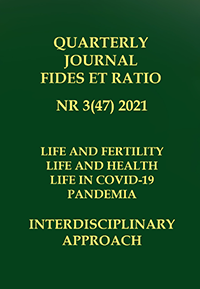Abstract
The article is empirical. The aim of the research was to diagnose the specificity of subjective experiences related to the impact of a pandemic situation on the shaping of the dialogical space. The focus was on the following problem: how do deaf people perceive their experiences of creating a space where authentic dialogue takes place? The research used the method of individual cases. The analysis of empirical material obtained on the basis of a narrative interview with deaf students allowed us to learn about their experiences and personal experiences related to the creation of a space in which dialogue takes place in a pandemic situation. Qualitative analysis showed three areas discussed by the respondents, these were reflections on: dialogue as a form of communication, the subject of dialogue and the value of dialogue. The collected narratives revealed emotional experiences that influenced the interpretation of events by deaf students.
References
Adamiec, T. (2003). Głuchoniemi i ich świadectwa życia od starożytności do końca wieku XVIII- przegląd problematyki, (w:) T. Gałkowski, M. Świdziński (red.), Studia nad kompetencją językową i komunikacją niesłyszących, 237-264, Warszawa: Wydawnictwo Uniwersytet Warszawski.
Borsook, P. (2000). Cyberselfish: A Critical Romp through the Terribly Libertarian Culture of High- Tech, New York: Public Affairs.
Cummings, J. N., Butler, B., Kraut, R. (2002). The quality of online social relationships, Communications of the ACM, 45(7), 103-108.
Dunaj, M. (2015). Głuchy-świat. Głuchota w perspektywie antropologii zaangażowanej, Łódź: Wydział Filozoficzno-Historyczny Uniwersytetu Łódzkiego.
Gara, J. (2008). Pedagogiczne implikacje filozofii dialogu, Kraków: Wydawnictwo WAM.
Kępiński, A. (2009). Poznanie chorego, Warszawa: Państwowy Zakład Wydawnictw Lekarskich.
Ladd, P. (2003). Understanding Deaf Culture: In Search of Deafhood, Clevelend- Bufallo- Torono- Sydney: Multilingual Matters LDT.
Pelczarska, K. (2014). Różne aspekty dialogu, Edukacja Etyczna, 8, 5-13.
Podgórska-Jachnik, D. (2013). Głusi. Emancypacje, Łódź: Wydawnictwo Naukowe Wyższej Szkoły Pedagogicznej w Łodzi.
Sofokles, (2009). Antygona, tłum. K. Morawski, Wrocław (i in:) Zakład Narodowy im. Ossolińskich.
Świdziński, M. (2005). Języki migowe, (w:) T. Gałkowski, E. Szeląg, G. Jastrzębowska (red.), Podstawy neurologopedii, 679-692, Opole: Wydawnictwo Uniwersytetu Opolskiego.
Tischner, J. (2006). Filozofia dramatu, Kraków: Wydawnictwo Znak.
Wellman, B. (1999). From Little Boxes to Loosely-Bounded Networks: The Privatization and Domestication of Community, (in:) J. Abu-Lughod (ed.) Sociology for the Twenty-First Century: Communities and Cutting Edges, 94-114, Chicago, IL: University of Chicago Press.
Wojtyła, K. (2004). Promieniowanie ojcostwa, (w:) K. Wojtyła. Poezje i dramaty, 258-291, Kraków: Wydawnictwo Znak.
Zaborniak-Sobczuk, M. (2009). Osoby z wadą słuchu wobec wybranych problemów integracji psychospołecznej, Rzeszów: Wydawnictwo Uniwersytetu Rzeszowskiego.

